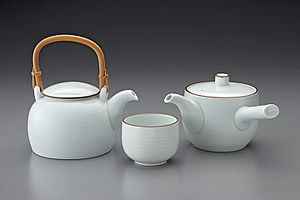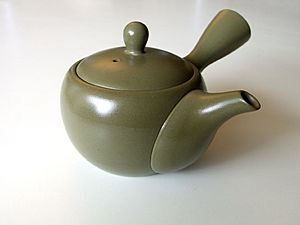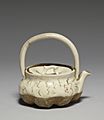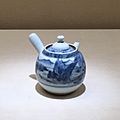Kyūsu facts for kids
A kyūsu (急須) is a special Japanese teapot. People mainly use it to make green tea. It's a key part of the traditional Japanese tea experience.
Many people think a kyūsu always has a handle on the side. But the word "kyūsu" simply means "teapot" in Japanese. Even though most kyūsu you see do have a side handle, not all of them do!
Contents
Types of Kyūsu Teapots
There are a few different kinds of kyūsu teapots. Each one has a unique handle style.
Side-Handle Kyūsu
The most common type is the yokode kyūsu (横手急須). This teapot has its handle sticking out from the side. It's designed to make pouring tea easy and comfortable, especially when you're sitting down.
Back-Handle Kyūsu
Another type is the ushirode kyūsu (後手急須). This one has a handle at the back, just like many teapots you might see in other parts of the world. It's a familiar design that works well for pouring.
Top-Handle Kyūsu
You can also find the uwade kyūsu (上手急須). These teapots have a handle on the very top. This design is often used for larger teapots or for certain types of tea ceremonies.
Special Features of Kyūsu
Some kyūsu teapots are known for their amazing craftsmanship.
Tokoname Ware Kyūsu
Tokoname ware is a famous type of Japanese pottery. It's especially known for making high-quality kyūsu teapots. These teapots are often made with great care and skill.
Clever Design Details
- Lids that Stay On: For smaller kyūsu teapots, the lids are sometimes made so perfectly that they won't fall off. This is thanks to something called water adhesion, which helps the lid stick slightly to the pot.
- No-Drip Spouts: The spout of a kyūsu is also very important. It's crafted at a special angle. This design helps make sure that no tea drops leak back onto the pot while you are pouring. It keeps things neat and tidy!
Images for kids
-
Kyūsu tea pot, Tokoname ware, Taishō era ca. 1921-1925, by Yamada Jozan I
ja:急須
 | Isaac Myers |
 | D. Hamilton Jackson |
 | A. Philip Randolph |






